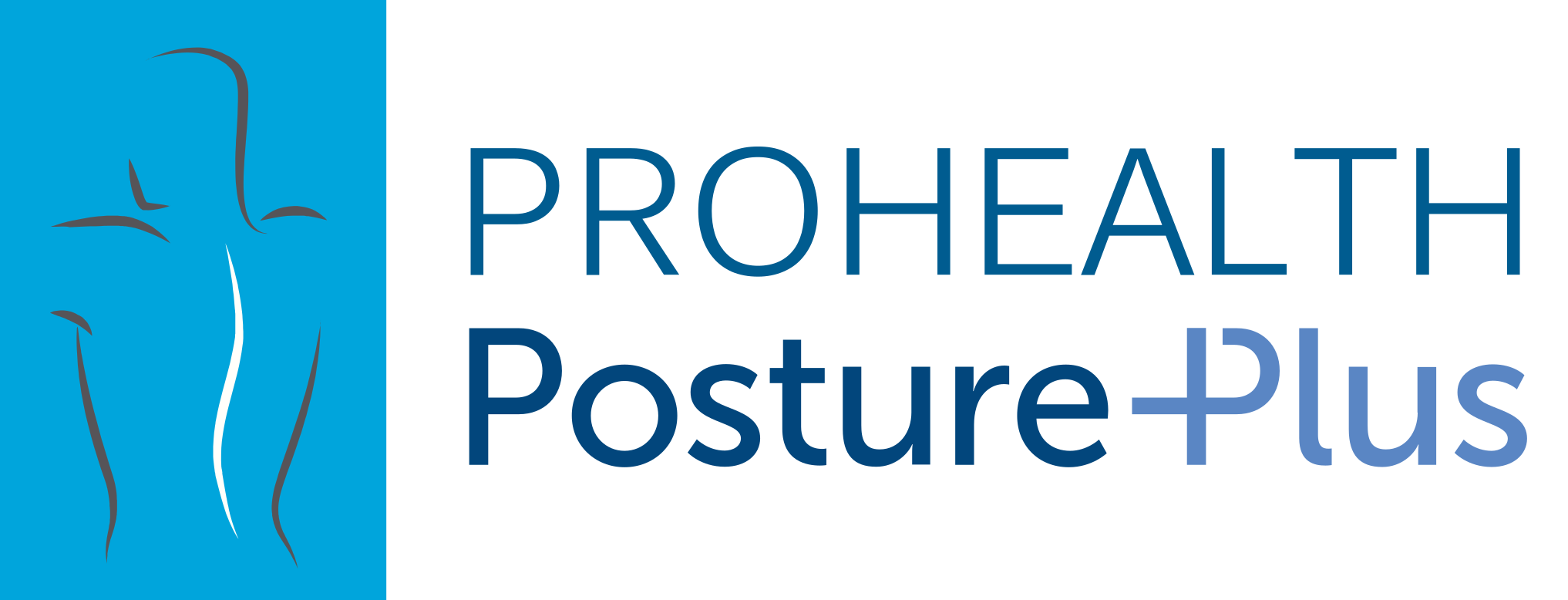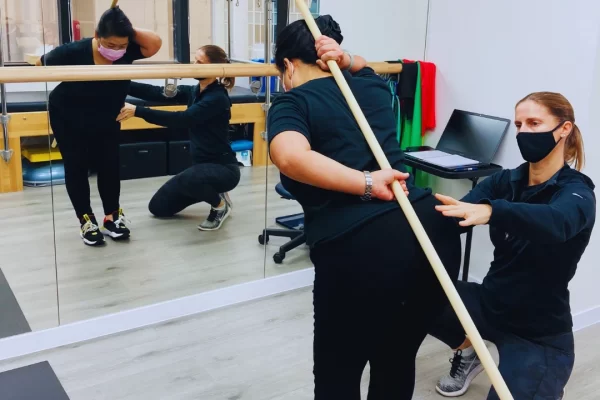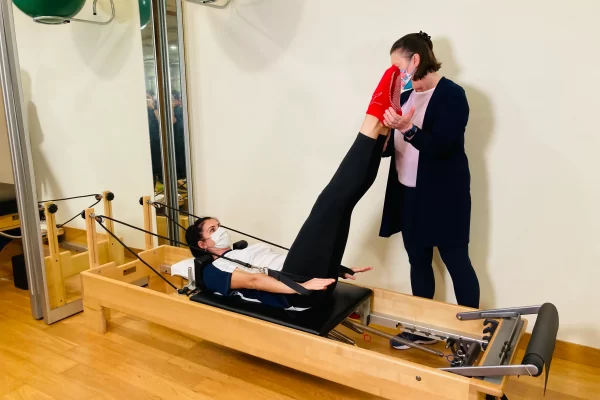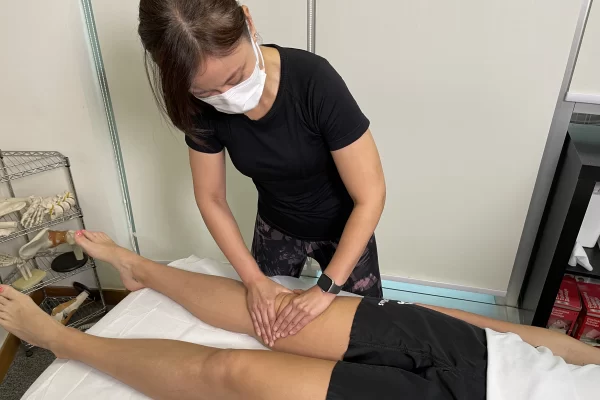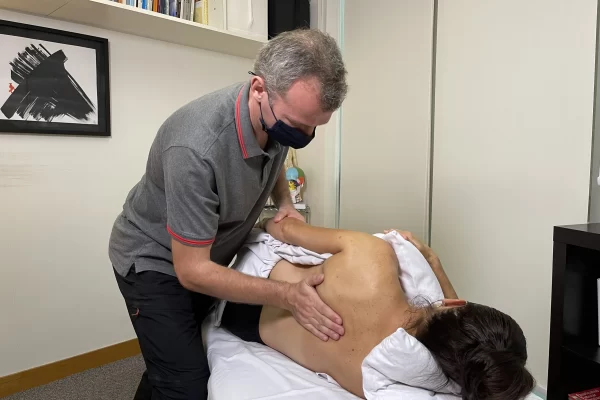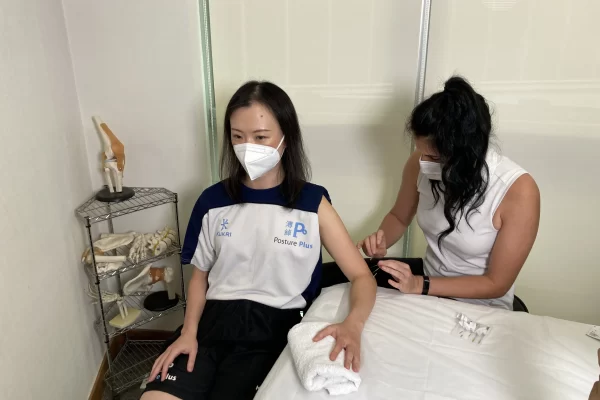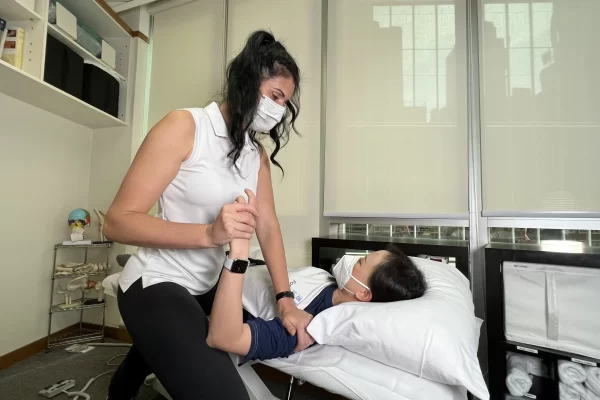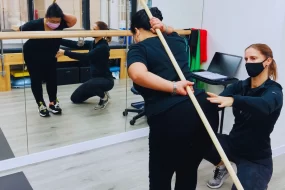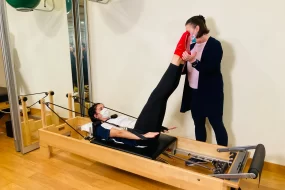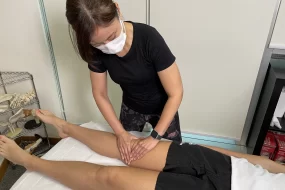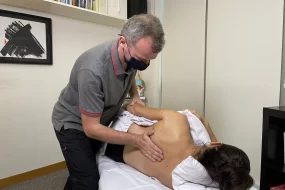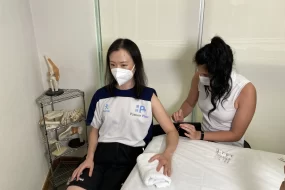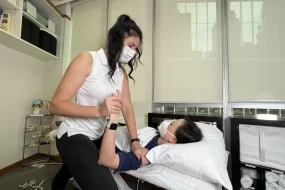Her love of postural and movement analysis started when she was an undergraduate studying at the University of Queensland under Emeritus Professor Gwendolen Jull, Dr Carolyn Richardson and Professor Vladimir Janda – all world renowned experts. When she was introduced to the Pilates Method in 1997 she instantly knew that the Pilates equipment would enable her to retrain muscle activation as well as static and dynamic movement patterns. All Prohealth Posture Plus Physiotherapists are trained in the Pilates Plus system.
- 9th Floor, 10 Pottinger Street, Central
- (852) 2167-8801
- reception@posture-plus.com
Pilates Plus / Clinical Pilates
- Home
- Pilates Plus / Clinical Pilates
Introduction
What is Pilates Plus?
The Pilates Plus program was founded by Australian-trained Physiotherapist Judith Anne Gould in 2007. Pilates Plus is an assessment and treatment programme formulated using over 35 years of clinical experience. Judith has been using the Pilates equipment for over 25 years to retrain posture and movement in her clients and has formulated a bespoke Physiotherapist training programme for her staff.
The most important component of Pilates Plus is the initial assessment. We use a standardised assessment which involves extensive questioning, observation of both static posture and dynamic movements, as well as photos and video analysis and research questionnaires. Following the assessment, the Physiotherapist formulates a list of the main problems found on assessment and a plan of how to treat the issues using the Pilates Plus technique.
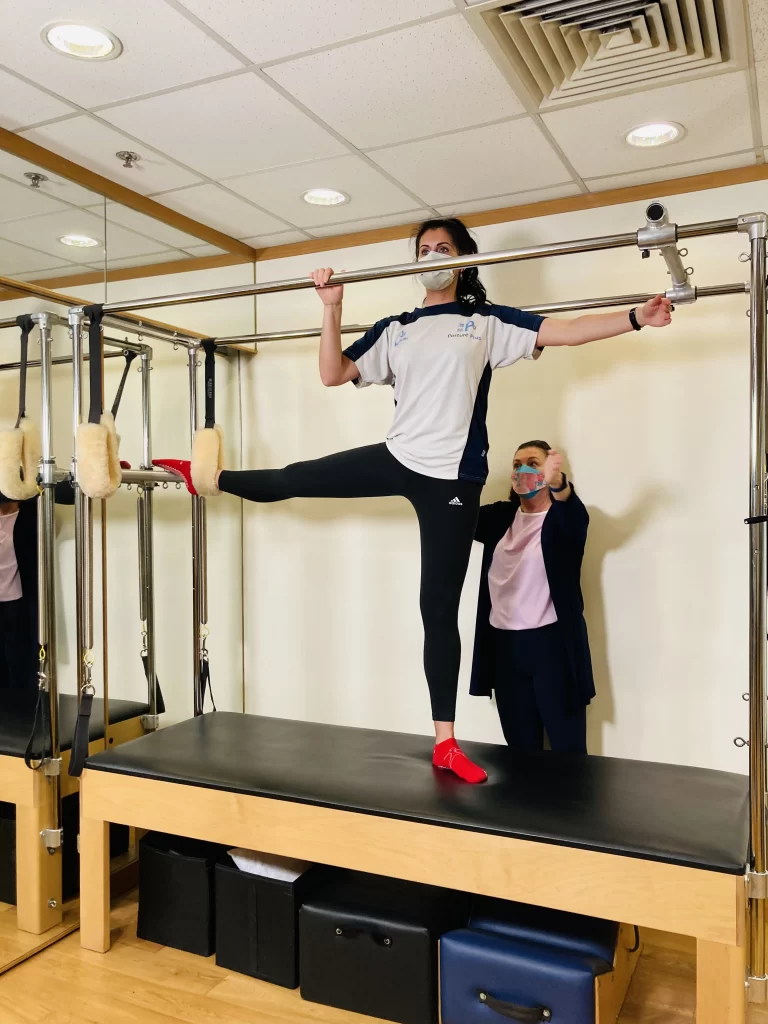


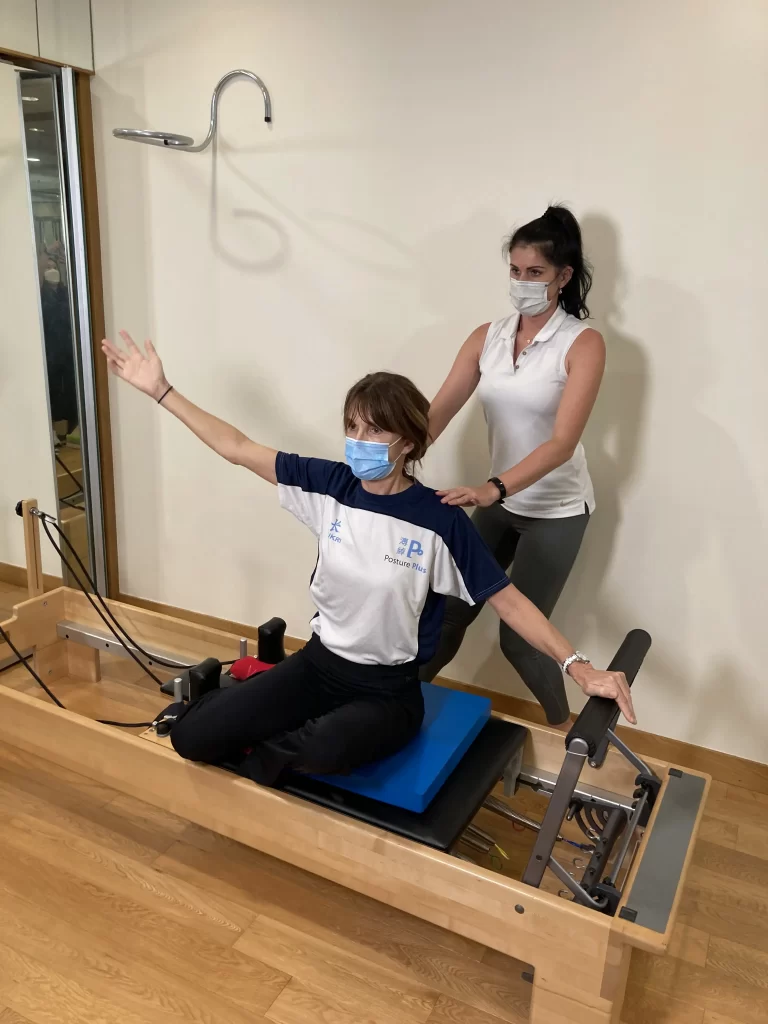
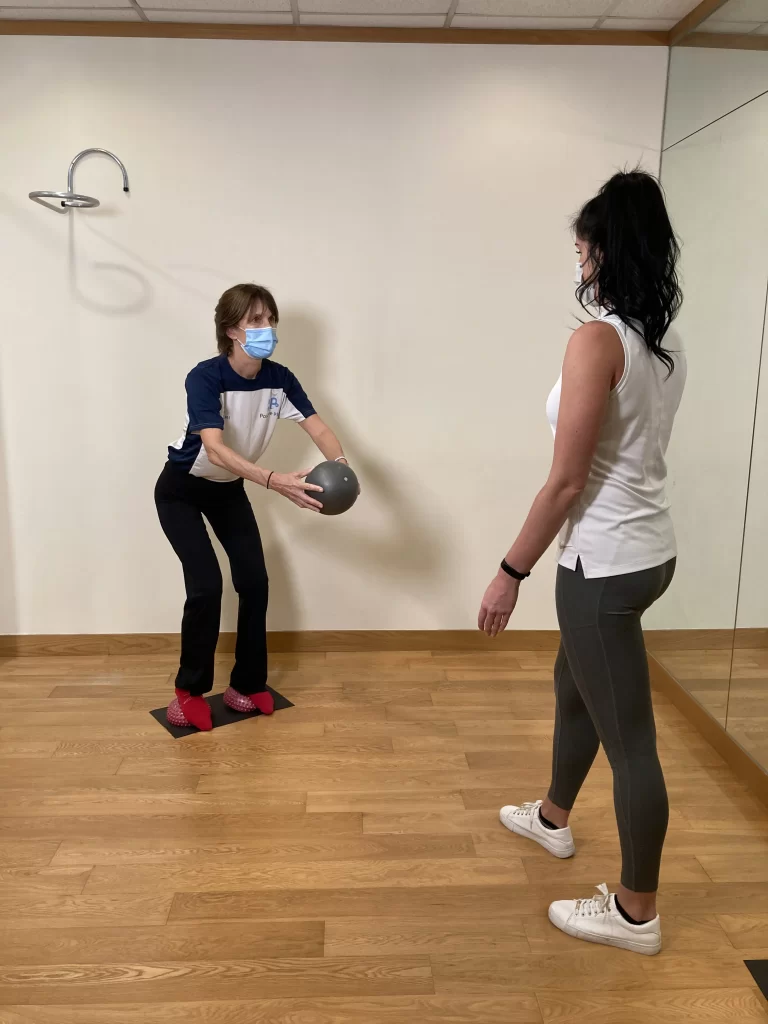
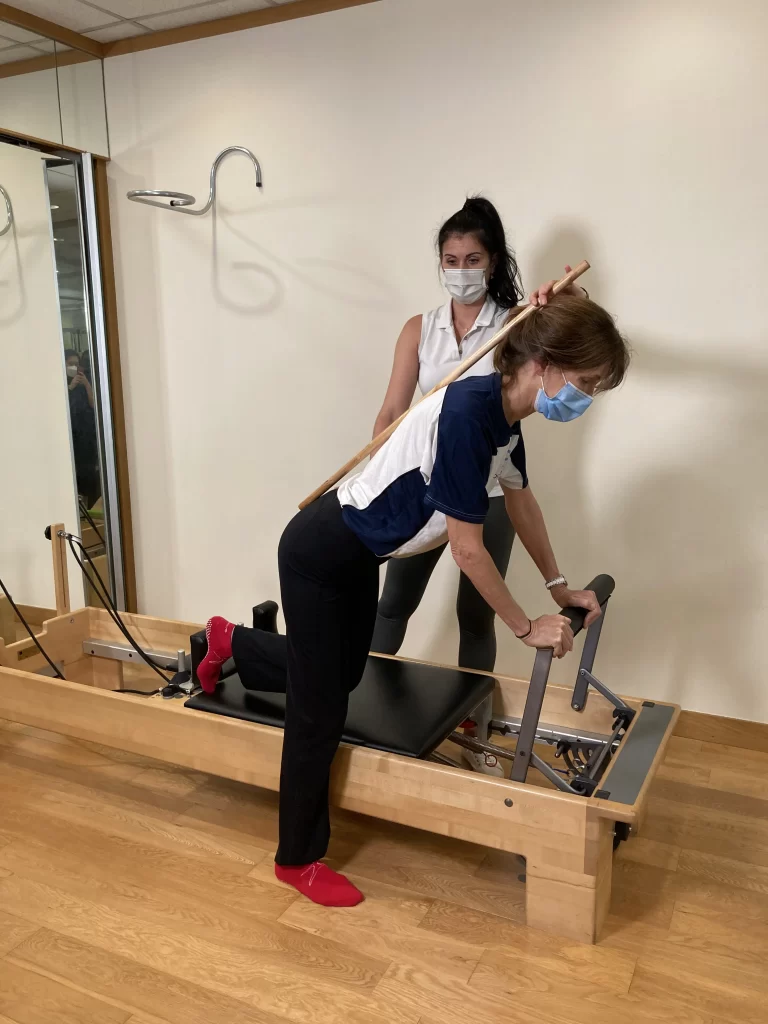
What to Expect?
The treatment technique involves specific training of the following areas:

Joint position

Muscle activation patterns

Movement control
Once stationary control is established through specific and targeted exercises, the various pieces of Pilates equipment (Reformer, Trapeze Table and Combination Chair) are used to provide resistance and assistance to basic movement patterns.
This provides a challenge to the client: maintaining control in different postures, changing directions and varying the amounts of load. The treatment does not end in the clinic as each client is given an exercise programme to complete at home. Pilates Plus is an active treatment method.
What to Expect?
The treatment technique involves specific training of the following areas:

Joint position

Muscle activation patterns

Movement control
Once stationary control is established through specific and targeted exercises, the various pieces of Pilates equipment (Reformer, Trapeze Table and Combination Chair) are used to provide resistance and assistance to basic movement patterns.
This provides a challenge to the client: maintaining control in different postures, changing directions and varying the amounts of load. The treatment does not end in the clinic as each client is given an exercise programme to complete at home. Pilates Plus is an active treatment method.



Conditions
Conditions Commonly Treated with Pilates Plus:
Our registered Physiotherapists provide tailored therapeutic Pilates programmes to help you improve your body posture, movement, and flexibility to speed up recovery from injuries and strengthen your overall performance.
Conditions
Conditions Commonly Treated with Pilates Plus:
Our registered Physiotherapists provide tailored therapeutic Pilates programmes to help you improve your body posture, movement, and flexibility to speed up recovery from injuries and strengthen your overall performance.
Conditions List
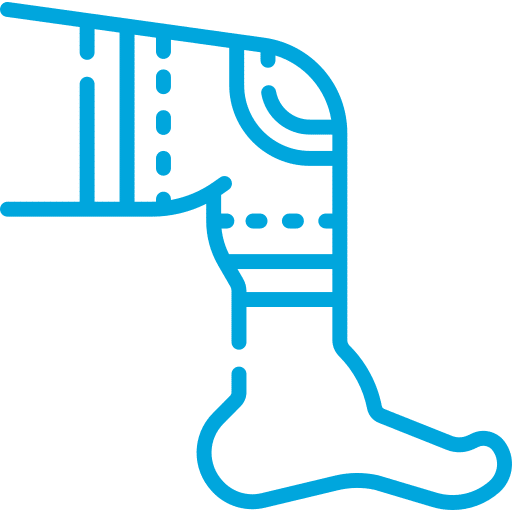
Scoliosis ITB Syndrome – “Runners Knee”

Low Back Pain

Sacro-Iliac Joint (SIJ) Instability

Neck Pain/ Headaches

Recurrent Ankle Sprains

Deep gluteal pain syndrome

TB Syndrome – “Runners Knee” Rotator Cuff Tears

Pre and Post-Natal

Post-surgery (disc replacements, fusion, ACL reconstruction, shoulder joint reconstruction)
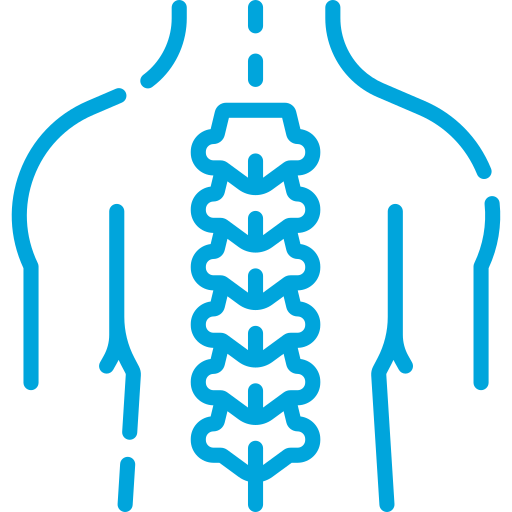
Scoliosis
Treatments
Pilates Plus Treatments:
Our registered Physiotherapists provide tailored therapeutic Pilates programmes to help you improve your body posture, movement, and flexibility to speed up recovery from injuries and strengthen your overall performance.
Treatment List
-
Onero™ for Improved Bone Health
Learn more about our Bone Health Programme here.
Osteoporosis is a common condition affecting millions. It is a serious disease that causes our bones to become weak which results in a higher chance of a broken bone (or fracture) when we have a simple fall. Osteopenia is characterised by lower than normal bone density and is considered a “warning” zone that action is needed to halt the loss or even to improve bone density.
At Posture Plus, we are licensed to deliver the Onero™ Programme. Onero™ is a research-based programme designed specifically to improve bone health, prevent osteoporotic fracture, and preventing falls in at-risk individuals.
To be safe and effective the programme is supervised by our registered physiotherapists who are trained and licensed to deliver the programme. In collaboration with our clinic Bone Health Asia at Prohealth Sports And Spinal, we are the first providers of this programme in Asia. Onero™ has successfully helped improve the bone health of osteoporosis and osteopenia patients in Australia since 2015.
-
Rehabilitation | Pilates Plus
Pilates Plus is an assessment and treatment programme formulated using over 35 years of clinical experience, which utilise Pilates equipment to retrain posture and movement. Our Pilates Plus Physiotherapists are all trained in the Pilates Plus programme by the Founder of Posture Plus and Pilates Plus, Judith Anne Gould.
-
Sports Physiotherapy
Sports Physiotherapists have specific post-graduate qualifications as well as extensive experience treating sports specific injuries. Clients may range from the amateur weekend warrior to international professional athletes. At Prohealth Posture Plus our sports Physiotherapists have worked at multiple Olympic and Asian Games looking after a variety of disciplines with teams from Hong Kong, Great Britain as well the United States of America.
The aim of a Sports Physiotherapist is to treat and fully rehabilitate the athlete post-injury or post-surgery, to prevent further injury and to return the athlete to sport in the shortest possible time. in In order to manage recurring or chronic injuries your therapist will conduct a comprehensive assessment, use a variety of manual therapy techniques and other evidence-based practice treatments.
We recognise that education is the key to playing sport safely. Our sports Physiotherapists have made it their responsibility to educate and provide advice on exercise prescription, stretching, a gradual return to sport and equipment recommendations. This extends to all players, with a focus on educating junior levels as we believe good habits are developed in our youth!
We recognise the challenges you face juggling work, family and sporting commitments. At the clinic we have a team approach so if we consider it appropriate we may also refer you to our Pilates Plus or Sports and Clinical Massage Therapists. This will enable us to provide the best treatment plan possible and have you back playing the sport you love as soon as possible.
-
Soft Tissue Massage
Massage is a proven, effective treatment technique used to release tension in muscles and fascia as well as scar tissue. While our Physiotherapists may choose to use soft tissue massage as part of your treatment session, they often refer clients to our Clinical and Sports Massage therapists for more intensive soft tissue release. Our Massage therapists have specialised training, extensive experience and a level of expertise in this area which complements the Physiotherapy-based treatments.
-
Acupuncture & Dry Needling
Acupuncture and dry needling are treatment modalities that your Physiotherapist may choose to utilise during your session. While both dry needling and acupuncture involve the insertion of thin needles into certain parts of the body, the reasoning behind each treatment method is very different. In acupuncture, needles are inserted into points along meridian lines. These lines represent the organs of the body and are based on ancient Chinese medicine. Acupuncture is based on the idea of balance and restoring proper flow of energy through-out the body. Dry needling is a relatively new treatment based on modern Western medicine. Needles are inserted into trigger points which are areas of pain, spasm or tension in muscles or fascia. When the needles are inserted into trigger points, they elicit a response that releases the trigger point and restores blood flow to the area and therefore normal function.
If you are fearful of needles or unsure, don’t hesitate to let your Physiotherapist know – they will always ask for your written permission before implementing either acupuncture or dry needling in your treatment programme.
-
Manual Therapy
Manual therapy is a method of assessment and treatment that is commonly used by musculoskeletal Physiotherapists. It aims to quickly reduce pain and improve movement and is based on clinical research. Manual therapy treatment can include techniques which glide joints in a rhythmic manner (mobilisation), gap joint surfaces (manipulation) and/or use muscle contractions to stabilise or loosen joints.
Manual therapy has been shown to be effective in treating neck and back pain with the majority of clients seeing a reduction in pain, muscle spasm and improvement in function immediately following a session. You may also receive “homework” stretches, mobilisation and strengthening exercises to continue your progress at home.
Frequently Asked Questions
Find the answers to your Pilates Plus related Questions.
Pilates Plus was founded by Australian-trained Physiotherapist Judith Anne Gould in 2007 and is an assessment and treatment programme formulated using over 35 years of clinical experience.
FAQ List
Everyone! Clients range from young children to the elderly, from office workers and weekend warriors to elite level sportsmen and women, as well as ante-natal and post-natal ladies. Conditions range from poor posture and mild discomfort to rehabilitation following extensive traumatic injuries caused by car accidents or sporting injuries.
The initial assessment is a detailed one-hour examination involving a postural assessment and specialised movement dysfunction tests. With the clients permission, photographs and video are taken and utilised to explain what postural and movement dysfunctions the Physiotherapist has found, how they may contribute to the current problems the client is experiencing and how they may be modified through exercise.
In order to contribute to clinical research, clients complete appropriate research questionnaires at the start, during and at the completion of the rehabilitation phase of treatment. Our research shows that within 5 sessions there is a significant improvement in pain levels and perceived disability with most clients finishing the rehabilitation phase between 8-12 sessions.
Follow-up sessions are always one-hour in duration but the client can choose different appointment types – for example a private session or sharing with 1 or a maximum of 2 other clients. Pilates Plus does not run classes where all the clients are performing the same exercise. The clinic uses the reformer, the trapeze table (Cadillac) and Wunda Chair as well as various smaller pieces of exercise and feedback equipment to provide the most effective treatment possible.
Everyone is different and the speed of recovery depends not only on the present level of dysfunction but also on the amount of pain, structural changes and the level of inflammation. Our experience in Hong Kong over the last 25 years has shown that significant improvements should be seen within 6 sessions with most clients finishing the Rehabilitation phase of treatment at around 10 sessions on average. At approximately the 8th session the client will be reassessed – using photos, video and our research outcome measures to objectively measure their progress.
The majority of clients choose to continue attending Pilates Plus as a Conditioning client in order to maximize their improvement. If your condition has not improved substantially within 10 sessions then your Pilates Plus trained Physiotherapist will re-evaluate your condition in order to understand why you haven’t responded as expected and will devise an ongoing treatment plan which may include further investigation or onward referral.
Some clients are referred by their Doctor or other health professionals to attend our clinic for Rehabilitation Pilates Plus. They have ongoing pain, structural or movement dysfunctions that require close attention, continual adaptation of treatment and regular contact with their Doctor and other treating health professionals. If the client is claiming back the cost of treatment from their insurer, detailed reports and progress letters are often required by the insurer. Their treatment progress will be more gradual and the exercises will be at a more basic level.
A typical Conditioning Pilates Plus client presents with a postural issue post-pregnancy or due to a poor work posture which generally doesn’t cause significant pain or restriction of daily activities. Their progress will be more rapid, the difficulty of their exercises more challenging and they will be more independent during their exercise sessions.
The first session is spent entirely on postural and movement analysis. Please bring along any investigation reports such as X-ray, MRI and your referral from your Doctor or other health professional. Bring along suitable clothes – comfortable t-shirt and shorts for the men and t-shirt and yoga pants for the ladies as well as a pair of socks. Don’t worry if you forget – we have clean clothing (T-shirt, shorts and non-slip socks) for you to borrow.
Each Pilates Plus session lasts 60 minutes. Unlike most Physiotherapy treatments, Rehabilitation Exercise using Pilates Plus is active – the client is guided through specific muscle activation and movement patterns, joint mobilisations, stretching and strengthening exercises. The Pilates equipment and other small pieces of equipment provide resistance, assistance and feedback thereby promoting more efficient and effective movement control. The founder of Pilates Plus has created an extensive list of exercise handouts for clients to take home with them in order to educate, promote self-help and self-maintenance and to continue the healing process outside of the clinic.
Comfortable t-shirt and shorts for the men and t-shirt and yoga pants for the ladies as well as a pair of socks are all that are required. If you forget your exercise clothes, don’t worry, we always have clean t-shirts, shorts, and non-slip socks for you to use at the clinic.
YES! It is encouraged that you continue your everyday life activities, sports and hobbies (unless they cause you pain) but at the same time you are asked to actively incorporate what you learn from Pilates Plus into your everyday activities such as running, playing golf, sitting at a desk, repeatedly picking up a small child or carrying groceries. By repeating the correct muscle activation and movement pattern in your everyday life, you will break poor movement habits faster and turn a conscious postural correction into an automatic one.
YES! Pilates Plus is a gentle form of exercise, which is not harmful to either the Mother to be or the baby. The majority of ante-natal clients continue attending Pilates Plus right up until just prior to giving birth. The treatment positions and exercise focus are adjusted according to the stage of pregnancy and take into account any specific pregnancy related problems such as Sacroiliac Joint instability or postural hypotension. When pregnant, it is always advisable to check with your doctor first before starting any new activity.
NO! The exercises are designed to help relieve pain by improving muscle activation, correcting muscle imbalances and improving bony alignment. The only pain felt should be mild muscle pain induced by the specific activation of weak/inhibited muscles or joint discomfort caused by mobilising previously restricted joints. All treatment-induced pain should completely disperse within 48 hours. If you feel pain for greater than 48 hours after your last session be sure to let your Pilates Plus Physiotherapist know.
If you feel any pain with the homework exercises, cease the exercises immediately and contact your Pilates Plus Physiotherapist.
At Pilates Plus we assess your entire posture not just the specific area where you feel the pain or stiffness. Our aim is to provide a complete appraisal rather than a “band-aid approach”, providing a clinically reasoned and evidence-based approach to the prescription of rehabilitation exercises. Our ongoing research shows that we have a significant effect on pain and functional restrictions on many different types of conditions. Our experience over the last 25 years has shown that the clients who continue their home exercise programme after discharge from active treatment, maintain and in most cases continue to improve on their results.
Our motto at Prohealth Posture Plus is to Restore, Improve, Maintain and Educate.
NO! However, there are physical conditions where certain movements or positions are contraindicated or need specific modification. All Pilates Plus Physiotherapists have undergone extensive training with the founder of Pilates Plus, Judith Anne Gould and have extensive experience and specialised knowledge in pathologies affecting the neuro-muscular-skeletal systems – training which sets them apart. They are therefore able to modify and prescribe the appropriate exercises for any existing special conditions or pathology.
At Pilates Plus, all Rehabilitation Clients complete relevant scientific research questionnaires and all clients who consent, have photos and video taken of their posture and relevant movement dysfunctions when they are first assessed. The questionnaires, photos and video are retaken after approximately 8 sessions to measure the improvement. Over the last 17 years, the data we have gathered has shown that pain was significantly decreased and functional disabilities were significantly improved in a variety of conditions such as: Low Back Pain, Sacro-Iliac Joint Instability, Neck Pain and Headaches, Recurrent Ankle Sprains, Deep Gluteal Syndrome, Scoliosis, ITB Syndrome – “Runners Knee”, Shoulder Rotator Cuff Tears, and Post surgery (disc replacements, shoulder and knee reconstructions).
In most cases the body continues to change in a positive direction over time following Pilates Plus intervention, especially if the client continues their homework exercises after discharge. However, as people may suffer further injuries, accidents or stressful times they may slide back into their “default” dysfunctional posture. So, additional sessions in the future may prove to be useful.
After completing the rehabilitation stage of treatment, most clients prefer to continue attending for postural maintenance as a conditioning client. Generally, the conditioning sessions are not covered by medical insurance but we do offer a package discount for these sessions. Other clients prefer to continue independently with their home exercise programme and return intermittently for progression of their home exercises or a Pilates Plus “posture check up”.
All clients are provided with an individually designed home exercise programme both during their active treatment and at discharge. Long-term experience (25 years and counting) has shown us that the home exercise programme is a vital tool to enhance not only the speed of recovery but also the maintenance of the postural improvements.
We do not run traditional mat or equipment classes where everyone in the room is doing the same exercise. While each client is treated as an individual case, after the initial assessment, they may choose to continue as a private client (1 client to 1 Physiotherapist) or to share a session with 1 or 2 other clients. All our clients have a specific treatment and home exercise programmes, which are devised and constantly monitored and adapted by their treating Pilates Plus Physiotherapist.
-
Conditions & Treatments
-
Conditions
Conditions Commonly Treated with Pilates Plus:
Our registered Physiotherapists provide tailored therapeutic Pilates programmes to help you improve your body posture, movement, and flexibility to speed up recovery from injuries and strengthen your overall performance.
Conditions
Conditions Commonly Treated with Pilates Plus:
Our registered Physiotherapists provide tailored therapeutic Pilates programmes to help you improve your body posture, movement, and flexibility to speed up recovery from injuries and strengthen your overall performance.
Conditions List

Scoliosis ITB Syndrome – “Runners Knee”

Low Back Pain

Sacro-Iliac Joint (SIJ) Instability

Neck Pain/ Headaches

Recurrent Ankle Sprains

Deep gluteal pain syndrome

TB Syndrome – “Runners Knee” Rotator Cuff Tears

Pre and Post-Natal

Post-surgery (disc replacements, fusion, ACL reconstruction, shoulder joint reconstruction)

Scoliosis
Treatments
Pilates Plus Treatments:
Our registered Physiotherapists provide tailored therapeutic Pilates programmes to help you improve your body posture, movement, and flexibility to speed up recovery from injuries and strengthen your overall performance.
Treatment List
-
Onero™ for Improved Bone Health
Learn more about our Bone Health Programme here.
Osteoporosis is a common condition affecting millions. It is a serious disease that causes our bones to become weak which results in a higher chance of a broken bone (or fracture) when we have a simple fall. Osteopenia is characterised by lower than normal bone density and is considered a “warning” zone that action is needed to halt the loss or even to improve bone density.
At Posture Plus, we are licensed to deliver the Onero™ Programme. Onero™ is a research-based programme designed specifically to improve bone health, prevent osteoporotic fracture, and preventing falls in at-risk individuals.
To be safe and effective the programme is supervised by our registered physiotherapists who are trained and licensed to deliver the programme. In collaboration with our clinic Bone Health Asia at Prohealth Sports And Spinal, we are the first providers of this programme in Asia. Onero™ has successfully helped improve the bone health of osteoporosis and osteopenia patients in Australia since 2015.
-
Rehabilitation | Pilates Plus
Pilates Plus is an assessment and treatment programme formulated using over 35 years of clinical experience, which utilise Pilates equipment to retrain posture and movement. Our Pilates Plus Physiotherapists are all trained in the Pilates Plus programme by the Founder of Posture Plus and Pilates Plus, Judith Anne Gould.
-
Sports Physiotherapy
Sports Physiotherapists have specific post-graduate qualifications as well as extensive experience treating sports specific injuries. Clients may range from the amateur weekend warrior to international professional athletes. At Prohealth Posture Plus our sports Physiotherapists have worked at multiple Olympic and Asian Games looking after a variety of disciplines with teams from Hong Kong, Great Britain as well the United States of America.
The aim of a Sports Physiotherapist is to treat and fully rehabilitate the athlete post-injury or post-surgery, to prevent further injury and to return the athlete to sport in the shortest possible time. in In order to manage recurring or chronic injuries your therapist will conduct a comprehensive assessment, use a variety of manual therapy techniques and other evidence-based practice treatments.
We recognise that education is the key to playing sport safely. Our sports Physiotherapists have made it their responsibility to educate and provide advice on exercise prescription, stretching, a gradual return to sport and equipment recommendations. This extends to all players, with a focus on educating junior levels as we believe good habits are developed in our youth!
We recognise the challenges you face juggling work, family and sporting commitments. At the clinic we have a team approach so if we consider it appropriate we may also refer you to our Pilates Plus or Sports and Clinical Massage Therapists. This will enable us to provide the best treatment plan possible and have you back playing the sport you love as soon as possible.
-
Soft Tissue Massage
Massage is a proven, effective treatment technique used to release tension in muscles and fascia as well as scar tissue. While our Physiotherapists may choose to use soft tissue massage as part of your treatment session, they often refer clients to our Clinical and Sports Massage therapists for more intensive soft tissue release. Our Massage therapists have specialised training, extensive experience and a level of expertise in this area which complements the Physiotherapy-based treatments.
-
Acupuncture & Dry Needling
Acupuncture and dry needling are treatment modalities that your Physiotherapist may choose to utilise during your session. While both dry needling and acupuncture involve the insertion of thin needles into certain parts of the body, the reasoning behind each treatment method is very different. In acupuncture, needles are inserted into points along meridian lines. These lines represent the organs of the body and are based on ancient Chinese medicine. Acupuncture is based on the idea of balance and restoring proper flow of energy through-out the body. Dry needling is a relatively new treatment based on modern Western medicine. Needles are inserted into trigger points which are areas of pain, spasm or tension in muscles or fascia. When the needles are inserted into trigger points, they elicit a response that releases the trigger point and restores blood flow to the area and therefore normal function.
If you are fearful of needles or unsure, don’t hesitate to let your Physiotherapist know – they will always ask for your written permission before implementing either acupuncture or dry needling in your treatment programme.
-
Manual Therapy
Manual therapy is a method of assessment and treatment that is commonly used by musculoskeletal Physiotherapists. It aims to quickly reduce pain and improve movement and is based on clinical research. Manual therapy treatment can include techniques which glide joints in a rhythmic manner (mobilisation), gap joint surfaces (manipulation) and/or use muscle contractions to stabilise or loosen joints.
Manual therapy has been shown to be effective in treating neck and back pain with the majority of clients seeing a reduction in pain, muscle spasm and improvement in function immediately following a session. You may also receive “homework” stretches, mobilisation and strengthening exercises to continue your progress at home.
-
-
Frequently Asked Questions
-
Frequently Asked Questions
Find the answers to your Pilates Plus related Questions.
Pilates Plus was founded by Australian-trained Physiotherapist Judith Anne Gould in 2007 and is an assessment and treatment programme formulated using over 35 years of clinical experience.
CONTACT USFAQ List
Who would benefit from Pilates Plus?Everyone! Clients range from young children to the elderly, from office workers and weekend warriors to elite level sportsmen and women, as well as ante-natal and post-natal ladies. Conditions range from poor posture and mild discomfort to rehabilitation following extensive traumatic injuries caused by car accidents or sporting injuries.
What to Expect from an assessment by a Pilates Plus Physiotherapist?The initial assessment is a detailed one-hour examination involving a postural assessment and specialised movement dysfunction tests. With the clients permission, photographs and video are taken and utilised to explain what postural and movement dysfunctions the Physiotherapist has found, how they may contribute to the current problems the client is experiencing and how they may be modified through exercise.
In order to contribute to clinical research, clients complete appropriate research questionnaires at the start, during and at the completion of the rehabilitation phase of treatment. Our research shows that within 5 sessions there is a significant improvement in pain levels and perceived disability with most clients finishing the rehabilitation phase between 8-12 sessions.
Follow-up sessions are always one-hour in duration but the client can choose different appointment types – for example a private session or sharing with 1 or a maximum of 2 other clients. Pilates Plus does not run classes where all the clients are performing the same exercise. The clinic uses the reformer, the trapeze table (Cadillac) and Wunda Chair as well as various smaller pieces of exercise and feedback equipment to provide the most effective treatment possible.
How many sessions do I need?Everyone is different and the speed of recovery depends not only on the present level of dysfunction but also on the amount of pain, structural changes and the level of inflammation. Our experience in Hong Kong over the last 25 years has shown that significant improvements should be seen within 6 sessions with most clients finishing the Rehabilitation phase of treatment at around 10 sessions on average. At approximately the 8th session the client will be reassessed – using photos, video and our research outcome measures to objectively measure their progress.
The majority of clients choose to continue attending Pilates Plus as a Conditioning client in order to maximize their improvement. If your condition has not improved substantially within 10 sessions then your Pilates Plus trained Physiotherapist will re-evaluate your condition in order to understand why you haven’t responded as expected and will devise an ongoing treatment plan which may include further investigation or onward referral.
What is the difference between Rehabilitation Pilates Plus and Conditioning Pilates Plus?Some clients are referred by their Doctor or other health professionals to attend our clinic for Rehabilitation Pilates Plus. They have ongoing pain, structural or movement dysfunctions that require close attention, continual adaptation of treatment and regular contact with their Doctor and other treating health professionals. If the client is claiming back the cost of treatment from their insurer, detailed reports and progress letters are often required by the insurer. Their treatment progress will be more gradual and the exercises will be at a more basic level.
A typical Conditioning Pilates Plus client presents with a postural issue post-pregnancy or due to a poor work posture which generally doesn’t cause significant pain or restriction of daily activities. Their progress will be more rapid, the difficulty of their exercises more challenging and they will be more independent during their exercise sessions.
What should I bring to the first Pilates Plus session?The first session is spent entirely on postural and movement analysis. Please bring along any investigation reports such as X-ray, MRI and your referral from your Doctor or other health professional. Bring along suitable clothes – comfortable t-shirt and shorts for the men and t-shirt and yoga pants for the ladies as well as a pair of socks. Don’t worry if you forget – we have clean clothing (T-shirt, shorts and non-slip socks) for you to borrow.
What can I expect from a typical Pilates Plus session?Each Pilates Plus session lasts 60 minutes. Unlike most Physiotherapy treatments, Rehabilitation Exercise using Pilates Plus is active – the client is guided through specific muscle activation and movement patterns, joint mobilisations, stretching and strengthening exercises. The Pilates equipment and other small pieces of equipment provide resistance, assistance and feedback thereby promoting more efficient and effective movement control. The founder of Pilates Plus has created an extensive list of exercise handouts for clients to take home with them in order to educate, promote self-help and self-maintenance and to continue the healing process outside of the clinic.
What should I wear for my Pilates Plus session?Comfortable t-shirt and shorts for the men and t-shirt and yoga pants for the ladies as well as a pair of socks are all that are required. If you forget your exercise clothes, don’t worry, we always have clean t-shirts, shorts, and non-slip socks for you to use at the clinic.
Can I continue my sports and other daily activities during the Pilates Plus treatment?YES! It is encouraged that you continue your everyday life activities, sports and hobbies (unless they cause you pain) but at the same time you are asked to actively incorporate what you learn from Pilates Plus into your everyday activities such as running, playing golf, sitting at a desk, repeatedly picking up a small child or carrying groceries. By repeating the correct muscle activation and movement pattern in your everyday life, you will break poor movement habits faster and turn a conscious postural correction into an automatic one.
Is it safe to do Pilates Plus during pregnancy?YES! Pilates Plus is a gentle form of exercise, which is not harmful to either the Mother to be or the baby. The majority of ante-natal clients continue attending Pilates Plus right up until just prior to giving birth. The treatment positions and exercise focus are adjusted according to the stage of pregnancy and take into account any specific pregnancy related problems such as Sacroiliac Joint instability or postural hypotension. When pregnant, it is always advisable to check with your doctor first before starting any new activity.
Does Pilates Plus hurt?NO! The exercises are designed to help relieve pain by improving muscle activation, correcting muscle imbalances and improving bony alignment. The only pain felt should be mild muscle pain induced by the specific activation of weak/inhibited muscles or joint discomfort caused by mobilising previously restricted joints. All treatment-induced pain should completely disperse within 48 hours. If you feel pain for greater than 48 hours after your last session be sure to let your Pilates Plus Physiotherapist know.
If you feel any pain with the homework exercises, cease the exercises immediately and contact your Pilates Plus Physiotherapist.
Will Pilates Plus resolve my injuries and take my pain away?At Pilates Plus we assess your entire posture not just the specific area where you feel the pain or stiffness. Our aim is to provide a complete appraisal rather than a “band-aid approach”, providing a clinically reasoned and evidence-based approach to the prescription of rehabilitation exercises. Our ongoing research shows that we have a significant effect on pain and functional restrictions on many different types of conditions. Our experience over the last 25 years has shown that the clients who continue their home exercise programme after discharge from active treatment, maintain and in most cases continue to improve on their results.
Our motto at Prohealth Posture Plus is to Restore, Improve, Maintain and Educate.
Are there any contraindications to Pilates Plus?NO! However, there are physical conditions where certain movements or positions are contraindicated or need specific modification. All Pilates Plus Physiotherapists have undergone extensive training with the founder of Pilates Plus, Judith Anne Gould and have extensive experience and specialised knowledge in pathologies affecting the neuro-muscular-skeletal systems – training which sets them apart. They are therefore able to modify and prescribe the appropriate exercises for any existing special conditions or pathology.
What benefits are reported following Pilates Plus?At Pilates Plus, all Rehabilitation Clients complete relevant scientific research questionnaires and all clients who consent, have photos and video taken of their posture and relevant movement dysfunctions when they are first assessed. The questionnaires, photos and video are retaken after approximately 8 sessions to measure the improvement. Over the last 17 years, the data we have gathered has shown that pain was significantly decreased and functional disabilities were significantly improved in a variety of conditions such as: Low Back Pain, Sacro-Iliac Joint Instability, Neck Pain and Headaches, Recurrent Ankle Sprains, Deep Gluteal Syndrome, Scoliosis, ITB Syndrome – “Runners Knee”, Shoulder Rotator Cuff Tears, and Post surgery (disc replacements, shoulder and knee reconstructions).
Do the postural changes from Pilates Plus last?In most cases the body continues to change in a positive direction over time following Pilates Plus intervention, especially if the client continues their homework exercises after discharge. However, as people may suffer further injuries, accidents or stressful times they may slide back into their “default” dysfunctional posture. So, additional sessions in the future may prove to be useful.
After completing the rehabilitation stage of treatment, most clients prefer to continue attending for postural maintenance as a conditioning client. Generally, the conditioning sessions are not covered by medical insurance but we do offer a package discount for these sessions. Other clients prefer to continue independently with their home exercise programme and return intermittently for progression of their home exercises or a Pilates Plus “posture check up”.
All clients are provided with an individually designed home exercise programme both during their active treatment and at discharge. Long-term experience (25 years and counting) has shown us that the home exercise programme is a vital tool to enhance not only the speed of recovery but also the maintenance of the postural improvements.
Do you do Pilates Plus group classes?We do not run traditional mat or equipment classes where everyone in the room is doing the same exercise. While each client is treated as an individual case, after the initial assessment, they may choose to continue as a private client (1 client to 1 Physiotherapist) or to share a session with 1 or 2 other clients. All our clients have a specific treatment and home exercise programmes, which are devised and constantly monitored and adapted by their treating Pilates Plus Physiotherapist.
Our Team
Physiotherapists
Our experienced Pilates Plus therapists are committed to delivering high-quality, personalised and patient-centred treatments, to achieve the best outcomes for each and every client.

Judith Anne Gould
Physiotherapist
Pilates Plus (Posture & Movement Dysfunction, Chronic Pain, Scoliosis), Ergonomics, Certified Onero™ Bone Density Practitioner

Agnes Wong
Physiotherapist
Sports Physiotherapy, Musculoskeletal Physiotherapy, Posture & Movement Dysfunction
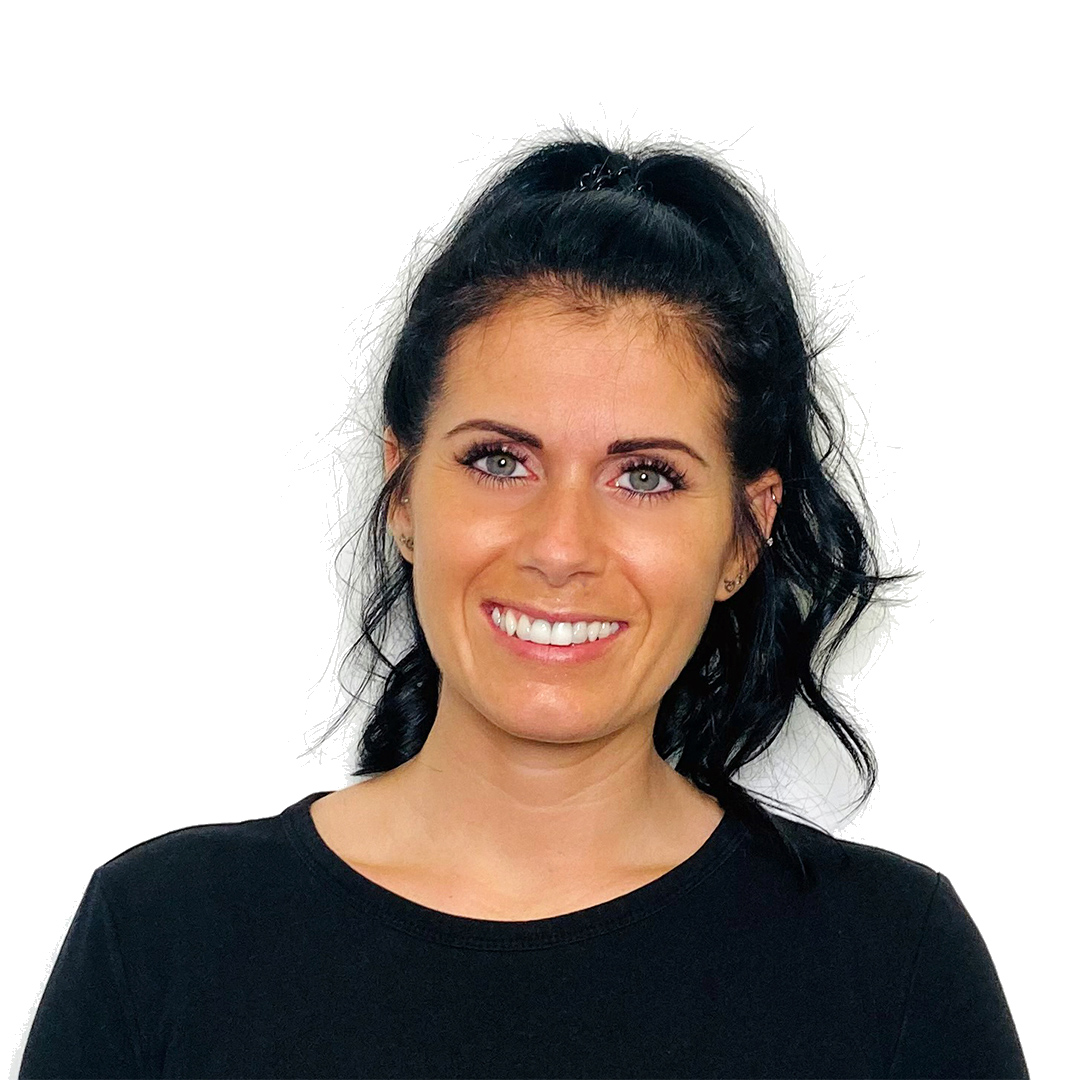
Natalie Fogg
Physiotherapist
Musculoskeletal Physiotherapy, Posture & Movement Dysfunction, Dry Needling, Pilates Plus Practitioner

Sophia von Burg
Physiotherapist
Pilates Plus Practitioner, Posture & Movement Dysfunction, Chronic Pain, Rehabilitative Strength & Conditioning , Certified Onero™ Bone Density Practitioner

Sylvia Chen
Physiotherapist
Pilates Plus Practitioner, Prenatal & Postpartum Pilates, Posture & Movement Dysfunction, Musculoskeletal Physiotherapy – Back & Neck Pain, Ergonomics

Sarah Wickham
Physiotherapist
Pilates Plus Practitioner, Children & Adolescents (Postural Problems & Scoliosis), Prenatal & Postpartum Pilates, Certified Onero™ Bone Density Practitioner
